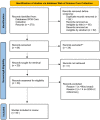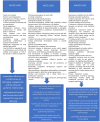Pathways to inclusive and equitable quality early childhood education for achieving SDG4 goal-a scoping review
- PMID: 35936241
- PMCID: PMC9354697
- DOI: 10.3389/fpsyg.2022.955833
Pathways to inclusive and equitable quality early childhood education for achieving SDG4 goal-a scoping review
Abstract
According to Sustainable Development Goal 4.2 (SDG 4.2), Equal Access to Quality Pre-primary Education, governments throughout the world are working to ensure that all children have access to high-quality early childhood development, care, and pre-primary education by 2030. In order to organize available evidence into a coherent framework, the current scoping review represents an exploratory synthesis addressing the broad question of what qualitative and inclusive Early Childhood Education and Care strategies are currently being established globally to achieve SDG4 targets. The goal of this scoping review in this respect, was to map the available research and offer an overview of micro-, meso-, and macro-level perspectives on evidence-based interventions and strategies, for the promotion of SDG4 globally. A layered model of early childhood education that is both inclusive and egalitarian education emerged, starting with the micro level: child, family and community, mezo level: nursery, and kindergarten and macro level: national policies and SDG 4.2 Agenda for 2030. The mezzo level connects the micro and macro levels, being the most solicited level of implementing inclusive and qualitative ECEC strategies. Thus, starting with putting a real emphasis on children rights, creating a qualitative and inclusive culture with a holistic understanding of child development, then investing in teacher preparation and instilling a strong belief and positive attitudes toward equity in early childhood services, developing inclusive educational policies with an authentic community support offered by all stakeholders, then adapting curriculum and assessment methods to all early childhood educational contexts and lastly piloting and up-scaling good practices, and investing in infrastructure, facilities and innovative educational services, SDG4.2 targets could transparently and efficiently be attained by 2030, with all the setbacks arisen from the pandemic context. The data provide light on a vast topic range, including human rights and values, policy actions, and ideologies. The micro-level themes emphasized the importance of fostering equitable and inclusive environments for children., as well as instructional approaches that encourage positive attitudes toward diversity and instructors' levels of experience in dealing with diversity. We also discovered the significance of creating chances that promote socialization, connection development, and a sense of belonging. Meso-level principles emphasized the relevance of schooling in a child's holistic development and skill acquisition. Mainstream availability for all children, national curriculum regulations, teacher preparation for inclusive early childhood education, excellent funding and governance, evaluation and monitoring, and research on inclusive early childhood education comprise the macro level. As a concept and an approach, inclusive and qualitative education necessitates the preparedness of all relevant educational components to participate. Providing inclusive education in the early years requires setting the foundation for subsequent levels of schooling. The active engagement of a young kid should be directed by developmentally and individually suitable curricula. Access to and participation in age-appropriate general curricula becomes critical in identifying and providing specialized support services. Inclusive programming does not imply that the educational programs will necessarily be of good quality. Efficiency and wellbeing are synonymous with equity. Equitable education investment benefits everyone in society, not just the most marginalized. Investing in education will help communities achieve all of the Sustainable Development Goals related to education.
Keywords: SDG4.2; inclusive and equitable quality early childhood education; macro level; meso level; micro level; scoping review.
Copyright © 2022 Rad, Redeş, Roman, Ignat, Lile, Demeter, Egerău, Dughi, Balaş, Maier, Kiss, Torkos and Rad.
Figures




Similar articles
-
Exploring conceptual and theoretical frameworks for nurse practitioner education: a scoping review protocol.JBI Database System Rev Implement Rep. 2015 Oct;13(10):146-55. doi: 10.11124/jbisrir-2015-2150. JBI Database System Rev Implement Rep. 2015. PMID: 26571290
-
Student and educator experiences of maternal-child simulation-based learning: a systematic review of qualitative evidence protocol.JBI Database System Rev Implement Rep. 2015 Jan;13(1):14-26. doi: 10.11124/jbisrir-2015-1694. JBI Database System Rev Implement Rep. 2015. PMID: 26447004
-
Beyond the black stump: rapid reviews of health research issues affecting regional, rural and remote Australia.Med J Aust. 2020 Dec;213 Suppl 11:S3-S32.e1. doi: 10.5694/mja2.50881. Med J Aust. 2020. PMID: 33314144
-
Impact of summer programmes on the outcomes of disadvantaged or 'at risk' young people: A systematic review.Campbell Syst Rev. 2024 Jun 13;20(2):e1406. doi: 10.1002/cl2.1406. eCollection 2024 Jun. Campbell Syst Rev. 2024. PMID: 38873396 Free PMC article. Review.
-
The Minderoo-Monaco Commission on Plastics and Human Health.Ann Glob Health. 2023 Mar 21;89(1):23. doi: 10.5334/aogh.4056. eCollection 2023. Ann Glob Health. 2023. PMID: 36969097 Free PMC article. Review.
Cited by
-
A Network Analysis-Driven Sequential Mediation Analysis of Students' Perceived Classroom Comfort and Perceived Faculty Support on the Relationship between Teachers' Cognitive Presence and Students' Grit-A Holistic Learning Approach.Behav Sci (Basel). 2023 Feb 9;13(2):147. doi: 10.3390/bs13020147. Behav Sci (Basel). 2023. PMID: 36829376 Free PMC article.
-
The use of theory of planned behavior to systemically study the integrative-qualitative intentional behavior in Romanian preschool education with network analysis.Front Psychol. 2023 Jan 9;13:1017011. doi: 10.3389/fpsyg.2022.1017011. eCollection 2022. Front Psychol. 2023. PMID: 36698596 Free PMC article.
-
The relationship between pre-service kindergarten teachers' professional identification and career adaptability: A chain mediation model.Front Psychol. 2022 Nov 14;13:1045947. doi: 10.3389/fpsyg.2022.1045947. eCollection 2022. Front Psychol. 2022. PMID: 36452368 Free PMC article.
-
Motivational profiles of kindergarten teachers in minority areas of China and their association with outcomes.Front Psychol. 2022 Oct 25;13:1023073. doi: 10.3389/fpsyg.2022.1023073. eCollection 2022. Front Psychol. 2022. PMID: 36389603 Free PMC article.
-
The impact of organizational commitment on turnover intention of substitute teachers in public primary schools: Taking psychological capital as a mediator.Front Psychol. 2022 Sep 23;13:1008142. doi: 10.3389/fpsyg.2022.1008142. eCollection 2022. Front Psychol. 2022. PMID: 36211912 Free PMC article.
References
-
- Abbate-Vaughn J., Paugh P. C., Douglass A. (2011). Sound bites won't prepare the next generation: Early childhood teacher education policy public-private divide in Massachusetts. Educ. Policy 25, 215–239. 10.1177/0895904810386602 - DOI
-
- Ackah-Jnr F. R. (2018). System and school-level resources for transforming and optimizing inclusive education in early childhood settings: What Ghana can learn. Eur. J. Educ. Stud. 5, 203–220. 10.5281/zenodo.1494880 - DOI
-
- Ackah-Jnr F. R., Fluckiger B. (2021). Leading inclusive early childhood education: the architecture of resources necessary to support implementation and change practice. Int. J. Disabil. Dev. Educ. 2021, 1–21. 10.1080/1034912X.2021.1885013 - DOI
-
- Addey C. (2021). Passports to the Global South, UN flags, favourite experts: understanding the interplay between UNESCO and the OECD within the SDG4 context. Global. Soc. Educ. 19, 593–604. 10.1080/14767724.2020.1862643 - DOI
Publication types
LinkOut - more resources
Full Text Sources
Research Materials

